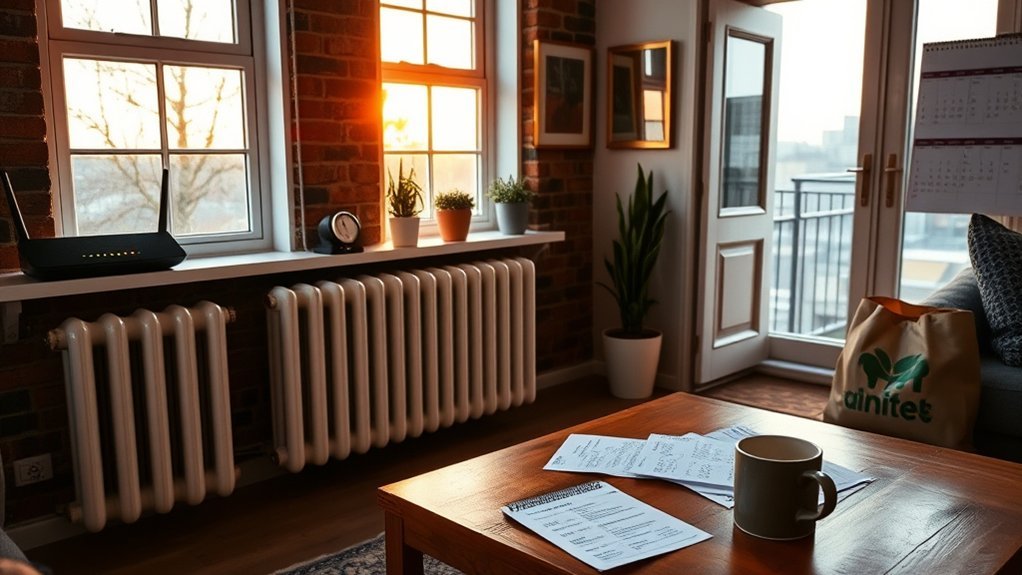You’ll typically need about £876–£978 a month (excluding tuition) to live in Salford, with rent the biggest cost: halls and PBSA ~£400–£560, private studios £460–£560, and private one‑beds £915–£1,050. Expect utilities of £120–£295 if not included, groceries £140–£180, and transport £50–£90. Use bills‑included lets, a student bank account and discounts like Railcard, UNiDAYS and campus offers to cut costs — keep going to see practical tips and examples.
Average Monthly Living Expenses for Students in Salford

Generally, you can expect monthly living costs in Salford (excluding tuition) to fall between about £876 and £978, with rent usually the biggest single expense.
When evaluating Living in Salford, use a cost of living calculator to model scenarios: halls, PBSA, or private flats change totals substantially.
Budget roughly £180/month for groceries (about £140 for basics) and add £40–£85 for entertainment and eating out.
Plan for local transport at about £90/month (monthly passes commonly £50–£80) and include internet or TV licence costs of £15–£30/month if not covered.
Utilities average about £120/month when not included, but private houses can run £231–£295; many student accommodations include bills, so confirm with your tenancy.
The University of Salford provides guidance and cost examples—check their student finance pages and local support services.
Use these figures to create a realistic monthly plan and adjust the calculator based on your chosen accommodation and lifestyle.
Breakdown of Accommodation Costs and Types

One key decision you’ll make as a student in Salford is the type of accommodation, since costs vary sharply. Choose between purpose-built student housing (PBSA), shared halls, or private lets. Shared student halls with communal bathrooms typically cost £400–£800/month; ensuite or studio PBSA averages £460–£560/month. Private one‑bed apartments in the city (Apartment in City) commonly sit between £915–£1,050/month, so private renting is clearly more expensive.
Many PBSA options include utility bills and superfast Wi‑Fi in the rent, reducing unexpected monthly costs. Private lets usually charge utilities separately — budget roughly an extra £120/month if utilities aren’t included, and check tenancy agreements for “fair usage” clauses. Most student accommodation lies within 3 miles of campus, though some options reach 20 miles. Start searching early to secure lower rents and better deals, and remember full‑time student status exempts you from Council Tax once registered.
Utilities, Internet and Household Bills Explained

Sorting out utilities, internet and household bills is one of the first practical steps after you sign your tenancy, because these costs can add £120–£295/month to your living expenses depending on whether bills are included.
If you live in private housing, budget roughly £231–£295/month for gas, electricity and water; purpose-built student accommodation often includes utilities and superfast Wi‑Fi in the rent.
Internet plans for 60 Mbps+ unlimited service cost about £15–£30/month, with a typical package near £21.
If you rent privately you’ll usually need to set up accounts in your name and check for standing charges or prepayment meters.
Factor in separate recurring items: a TV Licence if you watch live TV or use BBC iPlayer, and Council Tax — usually exempt for full‑time students but payable if you have non‑students in the household.
For straightforward budgeting, assume around £120/month if you live independently or verify any “fair usage” clauses in inclusive-tenancy contracts.
Food, Groceries and Dining Out Prices

You’ll find basic groceries in Salford cost modestly—expect about £140 per month for regular shopping, with items like a 500g loaf at £1.48, 1L milk at £1.35, a dozen eggs £3.75 and 1kg chicken fillets £10.00.
When you add occasional takeaways the total moves toward £180 per month. Eating out ranges from around £6.25 for a fast-food meal to £30–£80 for a mid-range three-course meal for two, while a cappuccino is about £3.00 and a 0.5L draught beer £3.40.
Grocery Price Examples
Grocery costs in Salford are fairly predictable, and knowing a few price points helps you budget more accurately: typical household groceries run about £180 per month (with essentials alone around £140), milk is roughly £1.35 per litre, a 500g loaf of white bread about £1.48, a dozen eggs near £3.75, chicken fillets about £10/kg and apples roughly £2/kg.
Use these benchmarks to plan weekly shop lists and track Groceries spending against your average cost targets. If you’re on a tight student life budget, focus on staples like pasta, oats and frozen veg to lower the monthly bill toward that essentials figure. Compare supermarkets, buy own-brand, and shop offers to keep routine costs close to the averages above.
Eating Out Costs
Having a handle on your weekly shop makes it easier to plan how often you’ll eat out and what that will cost: groceries average about £180/month (essentials ~£140), so regular meal-prepping can keep most food spending low while allowing occasional treats.
You’ll pay roughly £6.25–£9.35 for a fast-food meal and about £50–£80 for a mid-range dinner for two, so factor outings into your monthly budget.
Typical supermarket prices (milk £1.35/l, bread £1.48, 12 eggs £3.75, chicken £10/kg, apples £2/kg) guide grocery choices and swaps.
Expect £40–£85 per Month on entertainment and eating out.
Use Student Beans, UNiDAYS and budget supermarkets to cut costs — essential for affordable living and students planning tight budgets.
Transport, Commuting and Travel Passes

Although Salford’s local bus fares sit around £2–£2.40 one-way, monthly passes usually cost £50–£90 depending on zones and operator, so you should compare the pass price to your typical single fares to see if it pays off.
Work out weekly trips: if singles average £2, a £50 monthly travel pass breaks even after ~25 one-way trips.
Metrolink tram and combined tram/bus passes tend toward the top of the £50–£90 range, so factor multi-modal use.
If you’re a student, get a Student Railcard for 30% off trunk fares and check student travel passes; these can cut costs substantially for regular train commuters.
Living at home reduces rent but may raise travel spend and affect student finance eligibility, so include travel in your budget.
For the cheapest public option, prioritise bus-only passes or pay-as-you-go if you travel infrequently.
Recalculate quarterly as travel patterns or zone boundaries change.
Entertainment, Leisure and Student Discounts

Budget around £40–£85 a month for entertainment and leisure, factoring in occasional cinema trips (~£10–£18), live music nights or mid-range meals (~£30).
Use StudentBeans, UNiDAYS and a 16–25 Railcard (up to 30% off) plus campus and union events to cut those costs.
Also consider gyms at £17–£47/month, off‑peak student nights and free campus facilities to keep spending low.
Student Discount Platforms
You can cut entertainment and leisure costs substantially by tapping student discount platforms like StudentBeans and UNiDAYS, which typically offer 10–50% off or exclusive deals at restaurants, cinemas and retail in Salford.
Sign up with your university email or show student ID to access those offers and local concessions at attractions.
Get a Student Railcard for 30% off rail fares—savings add up on regular trips between Salford and Manchester.
Check campus noticeboards, student Facebook groups and university halls for time-limited promo codes and discounted event tickets; mid-range tickets often fall £5–15.
Look for bundled gym, event and leisure discounts from providers like iQ or student unions.
Track offers weekly: even small, repeated discounts cut monthly entertainment spend noticeably.
Affordable Leisure Options
Those student discount platforms and railcards are a great starting point for cutting leisure costs, but you can stretch your entertainment budget further by mixing free and low-cost options with selective paid treats.
Aim for an entertainment allocation of £40–£85 monthly within your overall living expenses, prioritising free campus events, discounted on-site activities in PBSA like iQ, and cultural offerings across Salford and Manchester.
Use a Student Railcard for up to 30% off travel to cheaper venues and book midweek cinema tickets (£10–£18) or budget meals (~£6.25) to reduce spend.
Compare gym deals (£17–£47) and university sports concessions.
Target budget-friendly areas for cafés (cappuccino ~£3) and inexpensive restaurants, reserving paid nights out for special occasions.
Practical Budgeting Tips and Money‑Saving Resources

Get a clear handle on your monthly outgoings by starting with the biggest costs: accommodation, food and utilities. Track actual rent (halls £400–£800, PBSA £460–£560, private one‑bed up to £915–£1,050) against average Salford living cost estimates (£876–£978/month).
Add groceries ~£180, transport ~£50–£90 (monthly pass £50–£62), and utilities ~£120 if not included.
Use student finance maintenance figures to verify annual affordability, and open a student bank account to simplify inflows and direct debits. Don’t exceed 20 work hours/week to protect study time.
Save by meal prepping, splitting bills with housemates, and choosing accommodation with bills included where it reduces overall cost variance.
Maximise discounts via UNiDAYS, StudentBeans, and transport student fares. Consult MoneySavingExpert and your university’s budgeting tools for personalised spreadsheets and step‑by‑step plans to hit savings targets and avoid unexpected shortfalls.
Frequently Asked Questions
How Much Does It Cost to Live in Salford?
You’ll spend about £876–£978 monthly; rent varies £400–£1,050. Factor groceries from local markets (£140–£180), public transport £50–£90, utilities £120–£295, and enjoy affordable student nightlife costs.
What Is the Average Cost of Living in the UK per Month With Rent?
You’ll typically spend £900–£1,300/month with rent, plus monthly utilities £100–£200, supermarket budgeting £150–£250 and transport passes £50–£120; costs vary by city, accommodation type and lifestyle choices.
Is Salford Cheaper Than Manchester?
Surprisingly, yes — you’ll usually pay less in Salford. With strong transport links, cheaper rents and comparable housing quality, you’ll save on housing and everyday costs, though nightlife comparison favors pricier Manchester city‑centre venues.
How Much Does It Cost to Live in the University of Salford?
You’ll pay about £876–£978/month living at University of Salford; rent varies, groceries £180–£220, local transport £50–£90, utilities ~£120. You can offset costs with part time work and enjoy student nightlife.
Conclusion
Think of your budget as a well-tuned bike: each pound is a spoke keeping you steady. Knowing average rent, bills, food and transport costs lets you tighten loose spokes and avoid a flat. Use cheaper halls or flatshares, track utilities and grocery spend, and grab student discounts to shave expenses. With data-driven choices and regular reviews, you’ll ride through Salford confidently—balanced, efficient, and ready for the unexpected.


